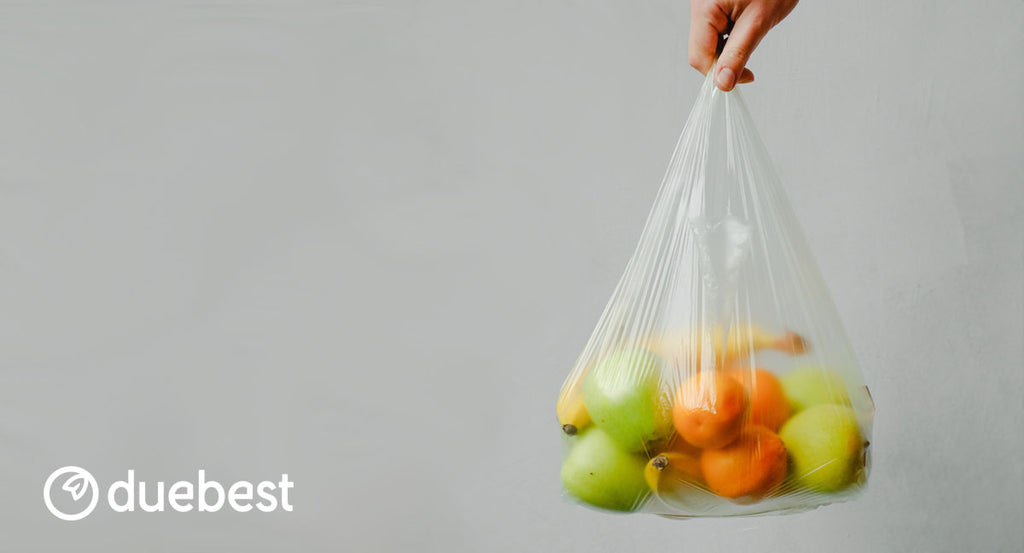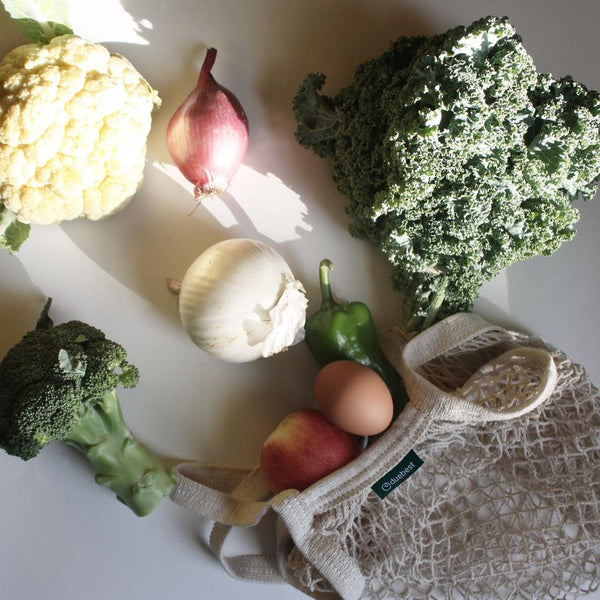Are Plastic Produce Bags Recyclable?

Humans are creatures of habit. For more than a half-century, those creatures have used plastic bags offered in the produce section of their local supermarkets and food stores. The reasons for this are obvious: plastic bags are easy to use, they keep us organized, they’re free, and they’re simple to transport.
But they’re also made of plastic — an artificial material with a sketchy profile in these modern times when we’re paying more attention to preserving the environment.
People all over the world use more than 1 trillion plastic bags every year, 100 billion of them in the US (about 1,500 per family). The plastic bags Americans use every year are manufactured using 12 million barrels of oil and generate 32 tons of plastic garbage.
With so much plastic in constant circulation and increased emphasis on sustainable solutions, it’s fair for earth-minded shoppers to ask: are plastic produce bags recyclable?
About the plastic used to make produce bags (film plastic)
The plastic used to make produce bags is generally referred to in the manufacturing industry as “film.” This film is produced using either high- or low-density polyethylene. Almost all of the film made is converted into either plastic construction materials or the bags we’ve used in the supermarket since the early 1960s.
Plastic film is ubiquitous and convenient, and challenging for many of us to completely stop using. But it’s not biodegradable, which means it can take centuries to fully decompose. Many of the resources used to produce plastic bags are non-renewable. Despite their light structure, plastic bags can also cause damage when they ensnare themselves in recycling or processing equipment.
Plastic bags are also the source of considerable litter throughout the world: They’re easily caught and set afloat in wind and can travel great distances from their point of use. They’re also problematic to other species, especially birds or marine life, who can accidentally ingest plastic while feeding.
Can plastic produce bags be recycled?
With all the environmental havoc they can unleash, the question remains: Are plastic produce bags recyclable? The answer is a very, very qualified “yes.”
Likely the most reliable solution for plastic produce bag recycling can be found at your local supermarket or big-box retailer. Many of the biggest chains have programs in which customers can drop off “packages” of used plastic bags for delivery to recycling facilities. After removing receipts, crumbs, and other materials, plastic bags can be bunched into a single, bigger bag, then delivered to the bins at their local retailers that have drop-off recycling programs.
There are, however, a few catches with such programs. Plastic bags that are eligible for recycling are designated by “#2” or “#4” symbols printed somewhere on the surface. Bags of other types may not be made from recyclable materials. Also, certain specific types of plastic packaging — candy wrappers, pet food bags, compost bags, pre-mixed salad bags, for example — cannot be used in most store drop-off recycling bags. Always check to make sure bags you have and whether they’re acceptable.
Curbside recycling of plastic bags is, as of now, offered in only a few cities and towns in the country. If you happen to live in an area that allows curbside pickup of plastic recyclables, use the same gathering guidelines (#2 or #4 bags, cleaned and fully dried) as you’d use for store drop-off recycling programs. Gather all your plastic produce bags in a larger bag, form it into a ball, and seal or tie the ends as tightly as possible.
Find out where you can recycle your plastic bags here: https://www.plasticfilmrecycling.org/recycling-bags-and-wraps/find-drop-off-location/
Use a reusable mesh produce bag instead
Even if you recycle all plastic produce bags properly and follow each guideline to the letter, there’s still no accounting for what may happen to the plastic once it leaves your hands. It can still get dislodged at the recycling facility, where it may catch in machinery gears or float off to become unsightly litter.
That’s why our strongest suggestion is to use a fabric-made, mesh produce bag whenever you shop — even for the loose items you find in the produce section that you’d normally tie up in a plastic bag.

Think about it: Most of the items you select from the produce section really don’t need their own storage bags. Onions, lemons, oranges, bunches of celery, and other single fruits and vegetables can simply go in your cart or basket, unsheathed. There’s no compelling reason the cashier needs to have them bagged; all they really care about is the weight of the item.
True, some produce items that are comparatively small and generally sold in multiple units — button mushrooms, for example — need some sort of bag on their way to check-out and on the way home. But they make up only a fraction of all the produce sold in the world. Just using reusable mesh produce bags for most of your produce makes an enormous difference, even with the occasional one-off plastic bag use.

Mesh bags designed for constant reuse are solid, easy-to-execute solutions for the environmental issues raised by plastic produce bags. Our Duebest reusable mesh produce bags are made of 100% cotton and a great alternative to those plastic grocery bags. Bring it with you to the store, your local farmers market, the beach, and just about anywhere.
About Duebest
Duebest began with two best friends over one bowl of egg noodles! We were at a restaurant in lower Manhattan when Daphne pulled out her own personal set of chopsticks. We never would have guessed that this small gesture would spark a whole chain of events! Today, we're doing our best to support the zero waste movement through our line of sustainably sourced products including our on-the-go reusable wooden cutlery set, reusable mesh produce bags, and our reusable glass straw with case.
